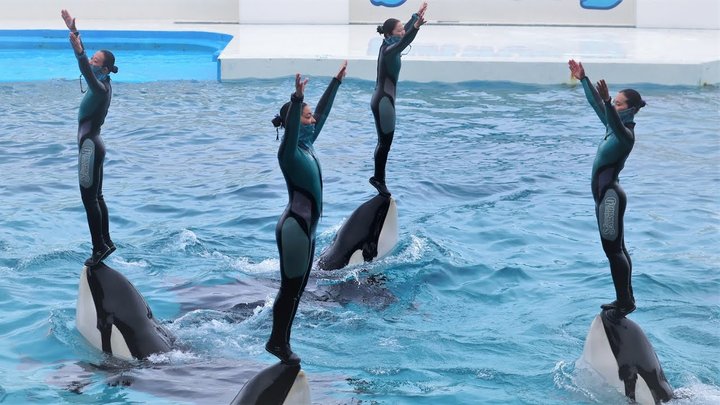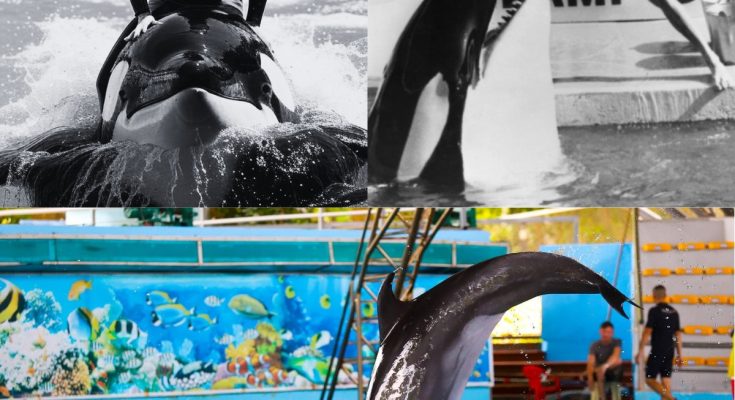The final footage sent chills down viewers’ spines: Jessica Radcliffe — the veteran trainer at Pacific Blue Marine Park — smiled and waved to the crowd just seconds before everything turned to tragedy. In the video now going viral across social media, the k!ller whale suddenly changed its behavior, and what happened next left the entire arena in stunned silence.
The final footage sent chills down viewers’ spines: Jessica Radcliffe — the veteran trainer at Pacific Blue Marine Park — smiled and waved to the crowd just seconds before everything turned to tragedy. In the video now going viral across social media, the killer whale suddenly changed its behavior, and what happened next left the entire arena in stunned silence.

It was supposed to be a routine performance. Jessica, with over 15 years of experience working with marine mammals, was a respected figure in the world of aquatic shows. The audience, mostly families with children on summer vacation, had gathered under the bright lights of the Pacific Blue stadium, unaware that they were about to witness one of the most haunting moments ever caught on camera at a marine park.
The video begins with music playing, the crowd clapping, and Jessica standing on the edge of the platform, signaling the orca to begin a series of familiar tricks. At first, everything seemed normal — the whale responded with precision and grace, leaping out of the water to thunderous applause. But as the routine neared its finale, something shifted.
Eyewitnesses described the change as “instant and terrifying.” The whale, named Kairo, stopped following Jessica’s cues. Its movements became erratic, circling the tank at high speed before diving deep and then suddenly launching upward — not in a trained leap, but a violent, uncontrolled lunge.
Within seconds, Kairo grabbed Jessica by the leg and pulled her into the water.
The gasps from the audience quickly turned into screams as trainers on the sidelines rushed into emergency mode, blowing whistles and attempting to distract the animal. But it was clear that this was no ordinary breach of routine. The orca had entered a state of distress — or defiance — and Jessica was caught in the middle of it.
What happened over the next minute has been described as both horrifying and heartbreaking. The water churned violently as rescue divers scrambled to intervene. Audience members fled the stands, some shielding their children’s eyes, others frozen in place. Staff eventually succeeded in luring Kairo into a separate holding area, but by the time Jessica was pulled from the water, the damage had been done.
She was rushed to a nearby trauma center, where she remains in critical condition as of this writing.
The incident has sparked renewed outrage and debate over the ethics of keeping killer whales in captivity. Animal rights organizations were quick to respond, with some calling the attack a “predictable consequence of unnatural confinement and exploitation.” Social media erupted in fury, with hashtags like #FreeKairo and #JusticeForJessica trending across platforms.

This is not the first time an orca has attacked a trainer during a performance, but the clarity of the footage and the sheer violence of the encounter have reignited a conversation many thought had settled after similar high-profile incidents in the past.
Pacific Blue Marine Park has since suspended all live shows indefinitely and issued a brief statement: “Our thoughts are with Jessica and her family. We are conducting a full internal investigation and cooperating with marine mammal experts to understand what happened. The safety of our staff and animals remains our top priority.”
However, critics argue that this response is not enough.
“It’s not a matter of safety protocols failing,” said marine biologist Dr. Elaine Morton. “It’s the fact that these intelligent, emotional creatures are being used for entertainment. No amount of training can erase their instincts — and eventually, something gives.”
Meanwhile, others are calling for immediate changes at the legislative level. A petition demanding the end of orca captivity in the United States has already gained over 1 million signatures within 24 hours.
Back at the marine park, the pool where the incident took place has been drained and cordoned off. A single flower bouquet rests on the railing — a quiet tribute to Jessica, whose life and career were built on a deep love for these creatures.
As night falls over Pacific Blue, the stadium stands eerily empty. But the echoes of that day — the cheers, the screams, the silence — remain. And for many, the question now is no longer “what went wrong?” but “why was this allowed to happen at all?”

